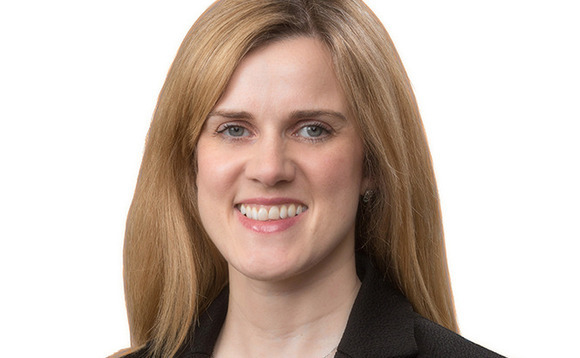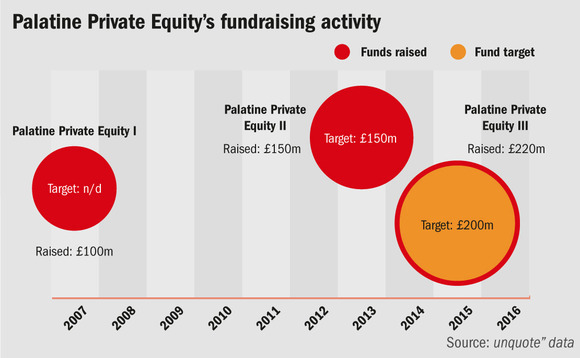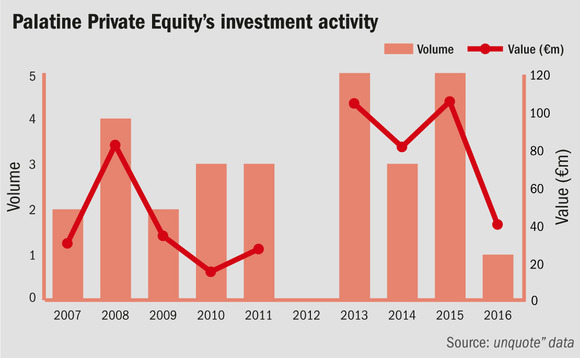
In Profile: Palatine Private Equity

Palatine Private Equity is a champion of regional private equity and was the first to set up shop in Manchester. Denise Ko Genovese talks deployment strategy and women in leadership with Beth Houghton (pictured) and Gary Tipper
Palatine Private Equity set up in Manchester in 2005 and, despite opening an office in London the same year, it has remained a champion of regional private equity. Over the past 11 years, roughly 70% of Palatine's deals have been in the north compared to 30% in the capital.
Palatine was actually the first private equity firm to set up shop in Manchester. The message was that you don't have to come to London to see private equity, says founding partner Gary Tipper.
"If you operate in the larger deal space and you are looking to do only one deal a year, then you can probably get away with doing it without a local office, but if you are looking to complete three or four deals a year, then you really need to be on the ground," he says.
In that same spirit, Palatine opened its Midlands office in Birmingham last year with Richard Thomas at the helm.
On the fundraising front, Tipper doesn't envisage being back on the trail until 2018. Palatine's third fund reached a final close in June 2015 at £220m and around £35m has so far been invested via two deals – Verdant Leisure in October 2015 and Vernacare in April 2016.
"You normally need to be 75% committed in your previous fund before you can close another fundraising – if we do the two deals we've got in diligence, we will have deployed £75m out of our £220m third fund that we raised in June last year," Tipper says.
The GP is set to fully realise its first fund by the middle of next year. Fund I closed on £100m in 2007 and is fully deployed with only two investments left. It has so far generated a 2.5x gross return multiple and 27% IRR. Fund II closed on £150m in 2013 and is fully invested in 11 deals, with one exit so far (Playnation).

There is a lot of cross-pollination in Palatine's three funds. All the investors from Fund I invested in Fund II, while £175m of Fund III came from investors in Fund II, with the remaining £45m coming from new investors, says Tipper.
From cocktails to healthcare
Strategy-wise, Palatine is not a sector specialist. The only common link between its investments is the ongoing conviction that backing the right management is paramount. The GP typically invests between £10-30m in UK-based entrepreneurial businesses.
Companies in their portfolio range from eclectic cocktail bar The Alchemist and healthcare business Vernacare to holiday price comparison provider Icelolly and holiday park chain Verdant Leisure.
Hidden gems in the GP's investor base include 30 high-net-worth individuals, such as Anthony Preston of Pets at Home fame, who help generate leads. The executive advisory board also plays a key role and now boasts former St Tropez CEO Michelle Feeney, who brings branded consumer expertise to the table.
Palatine has made three exits in the last 12 months: IT services business Selection, amusement and entertainment machine company Playnation and financial education group Wealth at Work.
"Wealth at Work was a great exit," says Tipper. "When we bought it in October 2011 from LDC, it was losing about £2m a year with assets under management of about £130m, but when we sold it to Equistone last September, it was forecast to make £1m with assets under management of £650m."
Palatine sold the business for £50m, making a 3.5x return on its investment. The GP retained a minority stake.
In the same month, Palatine exited Playnation to Austria-based Novomatic, marking the first exit from Fund II and delivering a 2.5x return and an IRR of 43%.

Flying the ESG flag
Beth Houghton heads up environmental, social and governance policy (ESG) for Palatine. And the fact that she is one of only a handful of women in the upper echelons of private equity – she made partner last year – is testimony to the fact that the GP does not just pay lip service to the initiative.
"Private equity companies should do more to encourage women both in their own teams and across their portfolios. Gender-balanced teams in general perform better than all-male teams. As part of our ESG initiative, we look at what we do for women in our portfolio, how many women are in top positions and how we can get [the right ones] to director level," says Houghton, who has risen up the ranks over her 10-year career with Palatine.
"I was studying for an MBA at Manchester Business School and contacted Gary and Ed [Fazakerley] to see if I could work as an intern while they were raising their first fund, and as soon as they got visibility on their first £60m fundraising, they hired me," she says.
"Our responsible investment programme is designed to drive performance in ESG in our own business undertakings and those of our portfolio. Our LPs are increasingly interested in ESG performance."
Some management teams are sceptical but they eventually come around, she admits, citing as an example restaurant business Gusto, which Palatine acquired in 2014.
"There is a lot of buy-in now and management are very excited [re ESG]. Rather than just focusing on risk, we encourage our companies to find the opportunities in ESG to create value and competitive advantage."
ESG changes in Palatine's portfolio include a new recovery system for Gusto and the living wage across all staff for Alchemist.
"Companies can see that it makes sense for the business because if people are happy there is less employee churn, more experienced employees and less spent on recruitment."
KEY PEOPLE
Gary Tipper – A founding partner of Palatine, Tipper previously worked at Aberdeen Murray Johnstone Private Equity. He is on the board of Alchemist, Gusto, Forrest and MJ Quinn.
Ed Fazakerley – A founding partner of Palatine, Fazakerley started his career with BDO Binder Hamlyn and Deloitte, and worked at Aberdeen Murray Johnstone Private Equity. He is on the board of Vernacare, Forrest, Chase Templeton Group, MoneyPlus and MJ Quinn.
Beth Houghton – Houghton joined Palatine in 2007 and became partner in 2015. She spent 10 years as a management consultant and has an MBA from Manchester Business School. She is on the board of Alchemist, Gusto, Icelolly and MoneyPlus.
Tony Dickin – A founding partner of Palatine, Dickin started his career at NatWest Acquisition Finance, working as a debt provider on private equity transactions. Prior to this he was head of Aberdeen Murray Johnstone Private Equity's London office. He is on the board of Wren Sterling, John Charcol, EPI Group and Selection Services.
Andy Lees – Lees is a partner and joined Palatine in 2013, having previously worked at EY, Aberdeen Murray Johnstone Private Equity, Barclays Ventures ad Barclays Corporate. He is on the board of Bernacare, WHP, Character World and Icelolly.
Latest News
Stonehage Fleming raises USD 130m for largest fund to date, eyes 2024 programme
Sponsor acquired the public software group in July 2017 via the same-year vintage Partners Group Global Value 2017
Stonehage Fleming raises USD 130m for largest fund to date, eyes 2024 programme
Czech Republic-headquartered family office is targeting DACH and CEE region deals
Stonehage Fleming raises USD 130m for largest fund to date, eyes 2024 programme
Ex-Rocket Internet leader Bettina Curtze joins Swiss VC firm as partner and CFO
Stonehage Fleming raises USD 130m for largest fund to date, eyes 2024 programme
Estonia-registered VC could bolster LP base with fresh capital from funds-of-funds or pension funds









